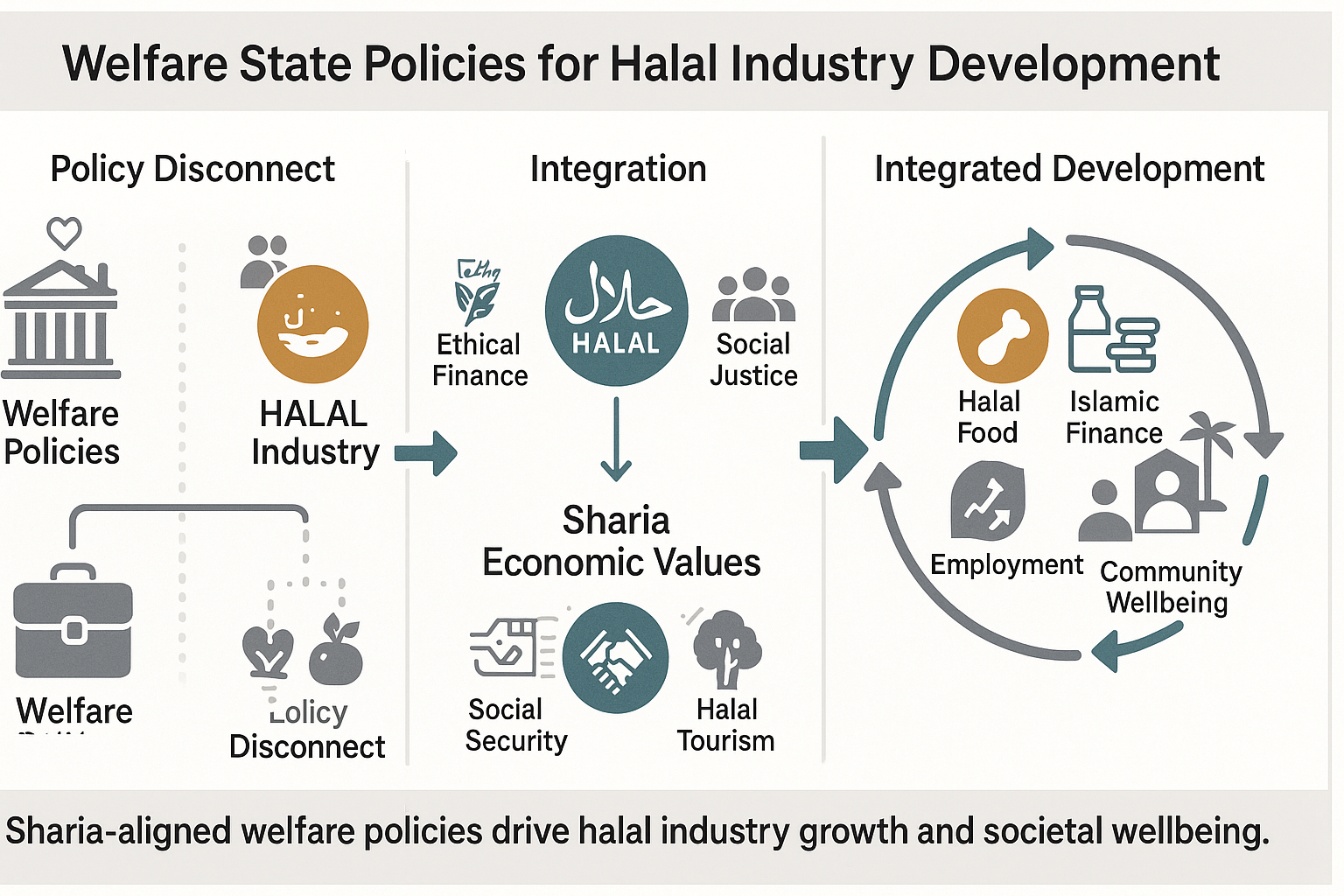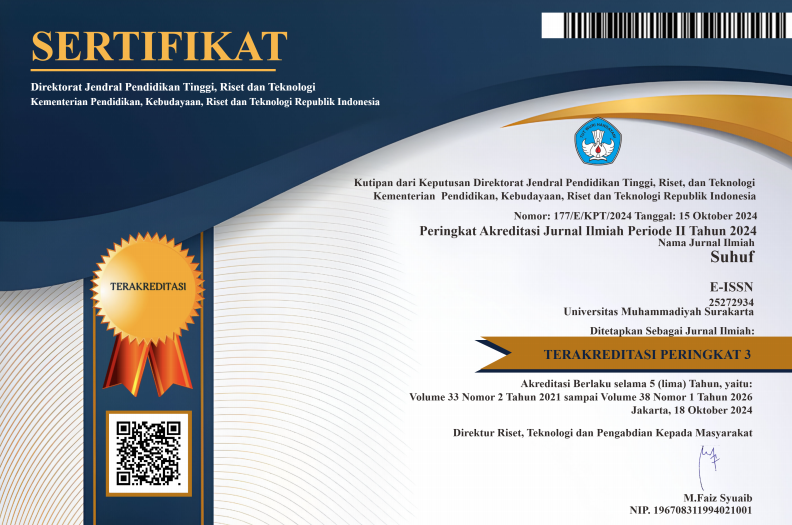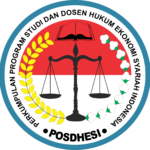Optimization of Welfare State Policy for the Development of Halal Industry in the Framework of Sharia Economy
DOI:
https://doi.org/10.23917/suhuf.v37i1.9195Keywords:
Welfare state, Halal industry, Sharia economy, Public policy, Inclusive developmentAbstract
This study explores the optimization of welfare state policies within the framework of halal industry development that aligns with Sharia economic principles. It aims to analyze the government's role in establishing an ecosystem that fosters the growth of the halal sector while upholding social welfare objectives. The research employs a comparative policy analysis across various countries, a review of Sharia economic literature, and interviews with stakeholders in the halal industry. The findings reveal that integrating Sharia values into the welfare state policy framework can promote innovation and expansion of the halal industry, while simultaneously enhancing overall societal welfare. This study offers policy recommendations to strengthen the synergy between welfare state goals and the advancement of the Sharia economy through the halal sector. The results are intended to guide policymakers in designing sustainable and inclusive development strategies, particularly in Muslim-majority countries where the halal industry and Sharia economy hold significant potential for social and economic progress.
Downloads
References
[1] W. Warto and S. Samsuri, “Sertifikasi halal dan implikasinya bagi bisnis produk halal di Indonesia [Halal Certification and Its Implications for the Halal Product Business in Indonesia],” Al Maal J. Islam. Econ. Bank., vol. 2, no. 1, pp. 98–112, (in Indonesia), 2020, doi: http://dx.doi.org/10.31000/almaal.v2i1.2803.
[2] I. Jamil, “Negara Kesejahteraan (Welfare State) Dalam Konteks Kebijakan Politik Ekonomi Islam Di Indonesia [The Welfare State in the Context of Islamic Economic and Political Policies in Indonesia],” El-Ecosy J. Ekon. Dan Keuang. Islam, vol. 1, no. 2, pp. 183–197, (in Indonesia), 2021, doi: https://doi.org/10.35194/.v1i2.1826.
[3] O. B. Saputri, “Pemetaan potensi indonesia sebagai pusat industri halal dunia [Mapping Indonesia’s Potential as a Global Halal Industry Hub],” J. Masharif Al-Syariah J. Ekon. Dan Perbank. Syariah, vol. 5, no. 2, pp. 23–28, (in Indonesia), 2020, doi: https://doi.org/10.30651/jms.v5i2.5127.
[4] E. Kurnia, R. D. A. Parmitasari, and M. W. Abdullah, “Tinjauan Mendalam Terhadap Dinamika Lembaga Keuangan Syariah: Masa Depan, Tantangan, Dan Inovasi [In-Depth Review of the Dynamics of Islamic Financial Institutions: Future, Challenges, and Innovations],” Neraca J. Ekon. Manaj. Dan Akunt., vol. 1, no. 5, pp. 292–303, (in Indonesia), 2023, doi: https://doi.org/10.572349/neraca.v1i5.506.
[5] Sultan, H. C. Rahayu, and Purwiyanta, “Analisis Kesejahteraan Masyarakat terhadap Pertumbuhan Ekonomi di Indonesia,” J. Inform. Ekon. Bisnis, vol. 5, no. 1, pp. 77–85, 2023, doi: https://doi.org/10.37034/infeb.v5i1.198.
[6] A. B. S. Saepudin, “Dampak Fashion Halal terhadap Industri Tekstil Tradisional di Negara-Negara Mayoritas Muslim [The Impact of Halal Fashion on the Traditional Textile Industry in Muslim-Majority Countries],” J. Ekon. KIAT, vol. 35, no. 1, pp. 73–83, (in Indonesia), 2024, [Online]. Available: https://journal.uir.ac.id/index.php/kiat
[7] K. A. Khoiry, M. A. S. Hafiz, and N. R. Ariansyah, “Perbandingan Antara Sistem Ekonomi Islam dan Ekonomi Konvensional: Kelebihan dan Kekurangan [Comparison Between the Islamic Economic System and the Conventional Economic System: Advantages and Disadvantages],” Islam. Educ., vol. 1, no. 3, pp. 446–455, (in Indonesia), 2023, [Online]. Available: http://maryamsejahtera.com/index.php/Education/article/view/584
[8] A. Azwar and K. Aqbar, “Strategi Penguatan Industri Halal di Indonesia: Analisis SWOT [Strategy for Strengthening the Halal Industry in Indonesia: SWOT Analysis],” Al-Khiyar J. Bid. Muamalah Dan Ekon. Islam, vol. 4, no. 1, pp. 47–71, (in Indonesia), 2024, doi: https://doi.org/10.36701/al-khiyar.v4i1.1432.
[9] M. Riyanto and V. Kovalenko, “Partisipasi masyarakat menuju negara kesejahteraan: memahami pentingnya peran aktif masyarakat dalam mewujudkan kesejahteraan bersama [Community Participation Toward a Welfare State: Understanding the Importance of Active Public Involvement in Achieving S,” J. Pembang. Huk. Indones., vol. 5, no. 2, pp. 374–388, (in Indonesia), 2023, doi: https://doi.org/10.14710/jphi.v5i2.374-388.
[10] E. Elviandri, K. Dimyati, and A. Absori, “Quo Vadis Negara Kesejahteraan: Meneguhkan Ideologi Welfare State Negara Hukum Kesejahteraan Indonesia [Quo Vadis the Welfare State: Affirming the Welfare State Ideology of the Indonesian Legal State],” Mimb. Huk., vol. 31, no. 2, pp. 252–266, (in Indonesia), 2019, doi: https://doi.org/10.22146/jmh.32986.
[11] I. Faizah, M. I. Fasa, S. Suharto, D. N. A. Rahmanto, and F. H. N. Athief, “Determinants of Domestic Direct Investment in Indonesia: Islamic Economic Approach,” JEJAK, vol. 12, no. 2, pp. 282–297, Nov. 2019, doi: 10.15294/jejak.v12i2.20973.
[12] J. Junaidi and N. U. Saleha, “Konsep Negara Kesejahteraan Menurut M. Umer Chapra [The Concept of the Welfare State According to M. Umer Chapra],” Syariah J. Ekon. dan Bisnis Islam, vol. 9, no. 1, pp. 13–36, (in Indonesia), 2021, doi: https://doi.org/10.15575/syh.v9i1.340.
[13] B. Setiyono, “Perlunya Revitalisasi Kebijakan Jaminan Kesehatan Di Indonesia [The Need for Revitalizing Health Insurance Policies in Indonesia],” Polit. J. Ilmu Polit., vol. 9, no. 2, pp. 38–60, (in Indonesia), 2018, doi: https://doi.org/10.14710/politika.9.2.2018.38-60.
[14] A. Riwanto and S. W. Gumbira, “Politik Hukum Penguatan Fungsi Negara Untuk Kesejahteraan Rakyat (Studi Tentang Konsep Dan Praktik Negara Kesejahteraan Menurut UUD 1945) [The Legal Politics of Strengthening the State’s Role for People’s Welfare (A Study on the Concept and Practice of th,” J. Huk. dan Peradil., vol. 6, no. 3, pp. 337–360, (in Indonesia), 2017, doi: http://dx.doi.org/10.25216/JHP.6.3.2017.337-360.
[15] B. Prianto, “Desentralisasi: Sebuah kajian awal tentang reformasi governance menuju welfare state [Decentralization: A Preliminary Study on Governance Reform Towards a Welfare State],” Spirit Publik, vol. 10, no. 2, pp. 118, (in Indonesia), 1907, [Online]. Available: https://d1wqtxts1xzle7.cloudfront.net/103512737/868-libre.pdf?1687127796=&response-content-disposition=inline%3B+filename%3DDecentralization_An_Initial_Study_on_Gov.pdf&Expires=1746972777&Signature=d5UlHDc0qts8MxUNDML7rkpRQviUxt7x2RsflR~9JeUDADmh0iDzZIxyR
[16] H. Haris and S. P. Astuti, “Nisbah Bagi Hasil dan Tingkat Bunga Dana Pihak Ketiga serta Pengaruhnya terhadap Produk,” SYIRKAH J. Ekon. Islam, vol. 5, no. 2, pp. 181–191, 2010, [Online]. Available: https://eprints.iain-surakarta.ac.id/id/eprint/4746
[17] N. I. Kurniawan, Globalisasi & Negara Kesejahteraan: Perspektif Institusionalisme [Globalization & the Welfare State: An Institutionalism Perspective]. Yogyakarta: Universitas Gadjah Mada, 2009.
[18] B. Ebbinghaus, “Comparing welfare state regimes: Are typologies an ideal or realistic strategy,” ESPAN, Edinburg, UK, pp. 1–20, 2012.
[19] I. G. I. Sudipa et al., Penerapan Sistem Informasi di Berbagai Bidang [The Implementation of Information Systems in Various Sectors]. Jambi: PT. Sonpedia Publishing Indonesia, 2023.
[20] A. Rahmawaty, “Distribusi Dalam Ekonomi Islam Upaya Pemerataan Kesejahteraan Melalui Keadilan Distributif [Distribution in Islamic Economics: Efforts to Equalize Welfare through Distributive Justice],” Equilibrium, vol. 1, no. 1, pp. 1–17, (in Indonesia), 2013, doi: http://dx.doi.org/10.21043/equilibrium.v1i1.198.
[21] A. R. Yunus, “Kinerja Badan Amil Zakat Nasional Provinsi Sulawesi Selatan (Tinjauan Makro),” Assets J. Ekon. Manaj. dan Akunt., vol. 9, no. 1, p. 24, 2019, doi: 10.24252/.v9i1.10052.
[22] U. Ahmed, A. Maruf, S. Alam, and L. Azizah, “The Role of Islamic Finance in Sustainable and Green Transition,” Suhuf Int. J. Islam. Stud., vol. 36, no. 2, pp. 118–139, 2024, doi: https://doi.org/10.23917/suhuf.v36i2.6314.
[23] T. Yuliawati, F. Adirestuty, A. Miftahuddin, and K. Hardiansyah, “Kebijakan merger bank pada perbankan Syariah: Studi bibliometrik dan perspektif kritis [Bank Merger Policy in Islamic Banking: A Bibliometric Study and Critical Perspective],” J. Inspirasi, vol. 13, no. 1, pp. 137–155, (in Indonesia), 2022, doi: https://doi.org/10.35880/inspirasi.v11i1.1979.
[24] S. A. Sapitri, “Transformasi Ekonomi Islam Di Timur Tengah: Perbandingan Saudi, Yaman, Dan Turki [The Transformation of Islamic Economics in the Middle East: A Comparison of Saudi Arabia, Yemen, and Turkey],” An Nawawi, vol. 3, no. 1, pp. 53–62, (in Indonesia), 2023, doi: https://doi.org/10.55252/annawawi.v3i1.31.
[25] M. Astuti, “Pengembangan Produk Halal Dalam Memenuhi Gaya Hidup Halal (Halal Lifestyle) [The Development of Halal Products to Accommodate the Growing Halal Lifestyle],” Iuris Stud. J. Kaji. Huk., vol. 1, no. 1, pp. 14–20, (in Indonesia), 2020, doi: https://doi.org/10.55357/is.v1i1.16.
[26] A. A. Jakfar and H. Purwanto, “Pengembangan Potensi Wilayah Bangkalan Melalui Gagasan Pembentukan KEK Industri Halal [Developing the Regional Potential of Bangkalan Through the Idea of Establishing a Halal Industrial SEZ (Special Economic Zone)],” J. Econ. Community Serv., vol. 1, no. 1, pp. 48–64, (in Indonesia), 2023, [Online]. Available: https://ejournal.ecodepartment.org/index.php/jecs/article/view/16
[27] F. Ula’m, W. Hasmi, A. B. Putri, and A. Setiyowati, “Penguatan Halal Value Chain “Pengembangan Halal Indutri : Sertifikasi, Peluang Dan Tantangan [Strengthening the Halal Value Chain: Halal Industry Development – Certification, Opportunities, and Challenges],” J. Mas Mansyur, vol. 1, no. 2, pp. 71–84, (in Indonesia), 2022, [Online]. Available: https://journal.um-surabaya.ac.id/MasMansyur/article/view/16796
[28] B. S. Hidayati, “Persepsi Konsumen terhadap Produk Halal dari UMKM : Dampak terhadap Keputusan Pembelian[Consumer Perception of Halal Products from MSMEs: Impact on Purchase Decisions],” J. Ekon. Dan Bisnis, vol. 4, no. 4, pp. 619–625, (in Indonesia), 2024, doi: https://doi.org/10.47233/jebs.v4i4.1925.
[29] R. Qoni’ah, “Tantangan dan strategi peningkatan ekspor produk halal Indonesia di pasar global [Challenges and Strategies for Increasing the Export of Indonesian Halal Products in the Global Market],” Halal Res. J., vol. 2, no. 1, pp. 52–63, (in Indonesia), 2022, doi: https://doi.org/10.12962/j22759970.v2i1.246.
[30] S. Zulaekah, M. L. Yunanta, and A. D. Wulandari, “Analisis Kesadaran Pelaku Usaha Makanan dan Minuman Terhadap Sertifikasi Halal [Analysis of Food and Beverage Business Actors’ Awareness of Halal Certification],” SYARIAH E-Proceeding Islam. Law, vol. 2, no. 2, pp. 17–30, (in Indonesia), 2023, [Online]. Available: https://ejournal.unida.gontor.ac.id/index.php/SYARIAH/article/view/11809
[31] M. Musrafiyan, “Potensi Pembangunan Kawasan Ekonomi Khusus (KEK) halal Barsela sebagai destinasi pariwisata prioritas di era society 5.0 [The Potential of Developing Halal Special Economic Zones (SEZ) in Barsela as a Priority Tourism Destination in the Era of Society 5.0,” in PROCEEDINGS ICIS 2021, 2022, pp. 488–501, (in Indonesia). [Online]. Available: https://jurnal.ar-raniry.ac.id/index.php/icis/article/view/12700
[32] B. D. Umbara and A. F. Supandi, “Analisis Strategi Pengembangan UMKM Halal di Jember dalam Menghadapi Persaingan Pasar Nasional (Studi pada Peluang dan Tantangan)[Analysis of Halal MSME Development Strategies in Jember in Facing National Market Competition (A Study on Opportunities and C,” J. Ekon. dan Bisnis Islam, vol. 2, no. 2, pp. 86–103, (in Indonesia), 2022, doi: https://doi.org/10.56013/jebi.v2i2.1584.
[33] Syamsuri, S. Yaumi, J. Fuadah, and Nadhilah, “Unveiling the Bright Prospects for Forecasting the Financial Strength of the National Board of Zakat (BAZNAS) in Indonesia,” in Conference on SDGs Transformation through the Creative Economy: Encouraging Innovation and Sustainability (TCEEIS 2023), Atlantis Press, 2024, pp. 80–84. doi: https://doi.org/10.2991/978-94-6463-346-7_16.
[34] G. Yustika, “Pandangan Wahbah az-Zuhaili dan Abdullah Saeed tentang Riba dan Relevansinya dengan Bunga Bank [The Views of Wahbah az-Zuhaili and Abdullah Saeed on Riba and Their Relevance to Bank Interest],” IAIN Parepare, 2021. [Online]. Available: https://repository.iainpare.ac.id/id/eprint/3551
[35] E. R. Nur, “Riba Dan Gharar: Suatu Tinjauan Hukum Dan Etika Dalam Transaksi Bisnis Modern [Riba and Gharar: A Legal and Ethical Review in Modern Business Transactions],” Al-’Adalah, vol. 12, no. 1, pp. 647–662, (in Indonesia), 2017, doi: https://dx.doi.org/10.24042/adalah.v12i1.247.
[36] R. Wahyudi and A. Susetyohadi, “The efficiency of Amil Zakat Institutions (LAZ) in Indonesian Islamic Banks: Data Envelopment Analysis Approach,” Madania J. Kaji. Keislam., vol. 25, no. 2, pp. 169–180, 2021, [Online]. Available: https://ejournal.iainbengkulu.ac.id/index.php/madania/article/view/4978
[37] S. Wahyuni, Ekonomi Zakat dan Waqaf. Gresik: CV. Jendela Sastra Indonesia Press, 2021.
[38] R. A. Norrahman, “Pembatalan Kontrak Perspektif Hukum Ekonomi Syariah [Contract Cancellation from the Perspective of Islamic Economic Law],” Iblam Law Rev., vol. 3, no. 3, pp. 292–304, (in Indonesia), 2023, doi: https://doi.org/10.52249/ilr.v3i3.206, (in Indonesia).
[39] M. Irwan, “Kebutuhan Dan Pengelolaan Harta Dalam Maqashid Syariah [Wealth Needs and Management within the Framework of Maqashid Sharia],” Elastisitas J. Ekon. Pembang., vol. 3, no. 2, pp. 160–174, (in Indonesia), 2021, doi: https://doi.org/10.29303/e-jep.v3i2.47.
[40] S. M. Hanafi and A. Sobirin, “Relevansi Ajaran Agama dalam Aktivitas Ekonomi[The Relevance of Religious Teachings in Economic Activities],” J. Iqtisad, vol. 3, no. 1, pp. 252–266, (in Indonesia), 2002, doi: https://doi.org/10.20885/iqtisad.vol3.iss1.art2.
[41] E. M. Kustinah and F. L. Nisa, “Peran Bank Syariah dalam Mendukung Pertumbuhan Sektor Halal di Indonesia [The Role of Islamic Banks in Supporting the Growth of the Halal Sector in Indonesia],” J. Rumpun Manaj. Dan Ekon., vol. 1, no. 3, pp. 357–366, (in Indonesia), 2024, doi: https://doi.org/10.61722/jrme.v1i3.1679.
[42] H. Rafsanjani, “Etika produksi dalam kerangka maqashid syariah [Production Ethics within the Framework of Maqasid al-Sharia],” J. Masharif Al-Syariah J. Ekon. dan Perbank. Syariah, vol. 1, no. 2, pp. 28–41, (in Indonesia), 2016, doi: https://doi.org/10.30651/jms.v1i2.763.
[43] M. Wahyudi, D. Fani, and I. Pratiwi, “Perspektif Hukum Ekonomi Syariah Dalam Investasi Saham Syariah Di Bursa Efek Indonesia [The Perspective of Sharia Economic Law on Sharia Stock Investment in the Indonesia Stock Exchange],” J. At-Tabayyun, vol. 4, no. 2, pp. 88–101, (in Indonesia), 2021, doi: https://doi.org/10.62214/jat.v4i2.69.
[44] D. F. Sasongko, E. W. H. Budianto, D. U. Arkaan, and A. Herawati, “Internalisasi nilai moderasi beragama dalam sistem ekonomi syariah pada UMKM halal melalui produk pembiayaan syariah [Internalizing the Values of Religious Moderation in the Sharia Economic System for Halal MSMEs through Sharia Financing Products],” Martabe J. Pengabdi. Masy., vol. 7, no. 4, pp. 1303–1320, (in Indonesia), 2024, doi: https://doi.org/10.31604/jpm.v7i4.1303-1320.
[45] L. Pattipeilohy, Y. A. Saingo, A. Kristen, and N. Kupang, “Pancasila Sebagai Dasar Sistem Kesejahteraan Masyarakat Indonesia [Pancasila as the Foundation of the Indonesian Social Welfare System],” Madani J. Ilm. Multidisiplin, vol. 1, no. 10, pp. 355–365, (in Indonesia), 2023, doi: https://doi.org/10.5281/zenodo.10137903.
[46] H. H. Adinugraha, M. Sartika, and A. Kadarningsih, “Desa wisata halal: konsep dan implementasinya di Indonesia [Halal Tourism Villages: Concept and Implementation in Indonesia],” Hum. Falah, vol. 5, no. 1, pp. 28–48, (in Indonesia), 2018, doi: http://dx.doi.org/10.30829/hf.v0i0.1336.
[47] A. N. Rohim, “Optimalisasi Wakaf sebagai Instrumen Pembiayaan UMKM untuk Pengembangan Industri Halal [The Optimization of Waqf as a MSME Financing Instrument for the Halal Industry Development],” J. Bimas Islam, vol. 14, no. 2, pp. 311–344, (in Indonesia), 2021, doi: https://doi.org/10.37302/jbi.v14i2.427.
[48] Y. Puspita et al., Makroekonomi Islam & Pembangunan Berkelanjutan. Banten: Sada Kurnia Pustaka, 2023. [Online]. Available: https://www.google.com/search?q=sada+kurnia+pustaka&oq=Sada+Kurnia+Pustaka&gs_lcrp=EgRlZGdlKgcIABAAGIAEMgcIABAAGIAEMggIARAAGBYYHjIICAIQABgWGB4yCAgDEAAYFhgeMggIBBAAGBYYHjIICAUQABgWGB4yCAgGEAAYFhgeMggIBxAAGBYYHtIBCDEyMjVqMGo0qAIAsAIB&sourceid=chrome&ie=UTF-8
[49] Z. Muzakki, “Integrasi ilmu ekonomi Islam dan pendidikan agama Islam era society 5.0 [Integration of Islamic Economics and Islamic Religious Education in the Era of Society 5.0],” Islam. Bank. Econ. Law Stud., vol. 2, no. 1, pp. 51–74, (in Indonesia), 2023, doi: https://doi.org/10.36769/ibest.v2i1.327.
[50] S. Priyono, “Zakat sebagai instrumen dalam kebijakan fiskal [Zakat as an Instrument in Fiscal Policy],” Al-Mashlahah J. Huk. Islam dan Pranata Sos., vol. 1, no. 02, pp. 125–142, (in Indonesia), 2013, doi: https://doi.org/10.30868/am.v1i02.145.
[51] Z. A. Mahran and M. H. Sebyar, “Pengaruh Peraturan Menteri Perdagangan (PERMENDAG) Nomor 31 Tahun 2023 terhadap Perkembangan E-commerce di Indonesia [Impact of the Minister of Trade Regulation (PERMENDAG) Number 31 of 2023 on the Development of E-commerce in Indonesia],” Hakim J. Ilmu Huk. dan Sos., vol. 1, no. 4, pp. 51–67, (in Indonesia), 2023, doi: https://doi.org/10.51903/hakim.v1i4.1440.
[52] E. Hariyanto and M. A. Junaidi, “Sinergi pengelolaan zakat dan program bantuan sosial pemerintah untuk mereduksi kemiskinan [Synergy Between Zakat Management and Government Social Assistance Programs to Reduce Poverty.],” J. BPPK Badan Pendidik. Dan Pelatih. Keuang., vol. 16, no. 2, pp. 13–31, (in Indonesia), 2023, doi: https://doi.org/10.48108/jurnalbppk.v16i2.785.
[53] V. Alfayed and A. Faujiah, “Peran Fatwa, Regulasi, dan Tata Kelola dalam Meningkatkan Kualitas dan Keamanan Produk Halal di Indonesia [The Role of Fatwas, Regulations, and Governance in Enhancing the Quality and Safety of Halal Products in Indonesia],” ICO EDUSHA, vol. 4, no. 1, pp. 104–113, 2023, doi: http://prosiding.stainim.ac.id/index.php/prd/article/view/424.
[54] G. S. Dewi and S. A. Rizka, “Tinjauan Maslahah Sertifikasi Halal Skema Self Declare Dalam Kepastian Hukum Perlindungan Konsumen Pelaku Usaha Mikro Dan Kecil[A Maslahah Review of the Halal Certification Self-Declare Scheme in Legal Certainty for Consumer Protection of Micro and Small,” Universitas Muhammadiyah Surakarta, 2023. [Online]. Available: https://eprints.ums.ac.id/113581/
[55] A. Nurdiansyah, “Halal certification and its impact on tourism in Southeast Asia: A case study halal tourism in Thailand,” in KnE Social Sciences, 2018, pp. 26–43. doi: https://doi.org/10.18502/kss.v3i5.2323.
[56] H. Herianti, S. Siradjuddin, and A. Efendi, “Industri Halal Dari Perspektif Potensi Dan Perkembangannya Di Indonesia [The Halal Industry from the Perspective of Its Potential and Development in Indonesia.],” Indones. J. Halal, vol. 6, no. 2, pp. 56–64, (in Indonesia), 2023, doi: https://doi.org/10.14710/halal.v6i2.19249.
[57] M. U. Muhlisa et al., “Strategi Kebijakan Fiskal Dalam Menunjang Pertumbuhan Ekonomi Di Indonesia [Fiscal Policy Strategies to Support Economic Growth in Indonesia],” J. Ilm. Ekon. Dan Manaj., vol. 2, no. 1, pp. 673–677, (in Indonesia), 2024, doi: https://doi.org/10.61722/jiem.v2i1.852.
[58] D. S. Muhammad and R. Rasyidah, “Diplomasi Ekonomi Kreatif Indonesia-Turki Sub-Sektor Fashion Muslim Melalui Kerjasama IT-CEPA Tahun 2016-2020 [Indonesia-Turkey Creative Economy Diplomacy: The Muslim Fashion Sub-Sector Through IT-CEPA Cooperation from 2016 to 2020],” Glob. Policy J. Int. Relations, vol. 10, no. 2, pp. 41–59, (in Indonesia), 2022, doi: https://doi.org/10.33005/jgp.v10i02.3747.
[59] A. Kurniawan, “Diplomasi Ekonomi Indonesia dan Thailand terhadap Pasar Timur Tengah [Indonesia and Thailand’s Economic Diplomacy Towards the Middle Eastern Market],” J. Ilmu Sos. dan Ilmu Polit., vol. 17, no. 3, pp. 254–271, (in Indonesia), 2014, doi: https://doi.org/10.22146/jsp.13081.
[60] M. B. Hak and A. B. Singandaru, “Halal Industrial Park: Inovasi Kawasan Green Economy dalam Pemberdayaan Industri Kecil dan Menengah [Halal Industrial Park: Green Economy Zone Innovation in Empowering Small and Medium Industries],” Elastisitas J. Ekon. Pembang., vol. 6, no. 1, pp. 61–69, (in Indonesia), 2024, [Online]. Available: https://unram.sgp1.digitaloceanspaces.com/simlitabmas/kinerja/penelitian/jurnal/199212312022031008-1718018939-163_article_text_719_1_10_20240331.pdf

Downloads
Submitted
Accepted
Published
How to Cite
Issue
Section
License
Copyright (c) 2025 Muhamat Nur Maarif , Sirajul Munir , Hadenan Towpek , Iskandar Zulqarnain

This work is licensed under a Creative Commons Attribution 4.0 International License.


















